Understanding the permanent dentures vs implants cost will help you make the best choice for your dental restoration. This article will compare the costs of permanent dentures and dental implants, and also discuss the factors that impact the dental implants vs dentures cost to help you make an informed decision.
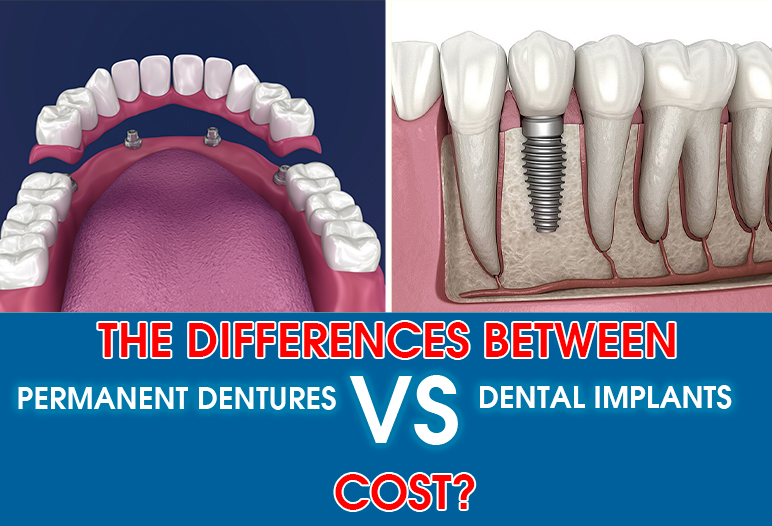
Understanding Permanent Dentures and Implants
What are Permanent Dentures?
Permanent dentures are typically understood as a type of denture that cannot be removed, usually attached to dental implants. They are designed to replace one or more missing teeth and provide a close-to-natural feel, helping to restore chewing function and improve aesthetics.
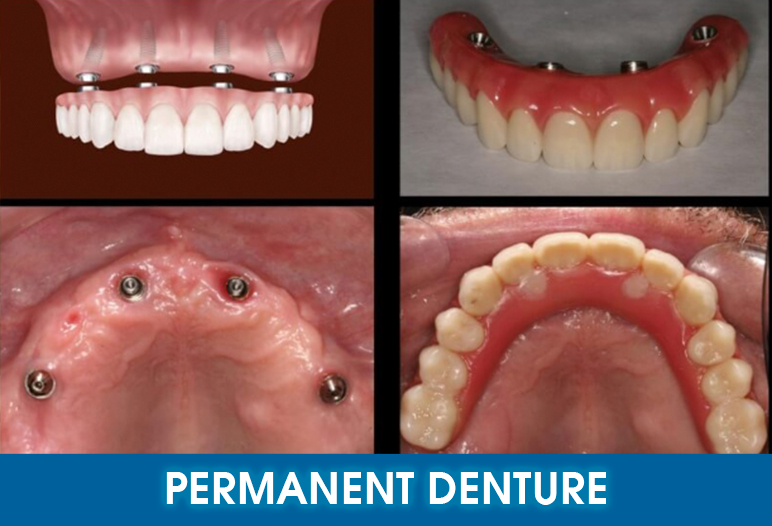
Types of Permanent Dentures
- Fixed Partial Dentures (Bridges): Bridges fill the gaps left by missing teeth. They anchor artificial teeth to nearby natural teeth, ensuring stability and functionality.
- Implant-Supported Dentures: These dentures use dental implants for support. They help prevent bone loss and provide a long-lasting solution. Implant-supported dentures offer a secure fit for everyday use.
- All-on-4 Dentures: All-on-4 dentures are an affordable option for replacing an entire arch of teeth. This method uses four dental implants to support a complete set of replacement teeth. It’s efficient and promotes quicker recovery.
Exploring dental implants
Dental implants represent a more advanced method. Implants involve placing a titanium post into the jawbone to replace the root of a missing tooth, after which a crown is attached to the post. Implants not only restore aesthetics but also help maintain the structural integrity of the jawbone.
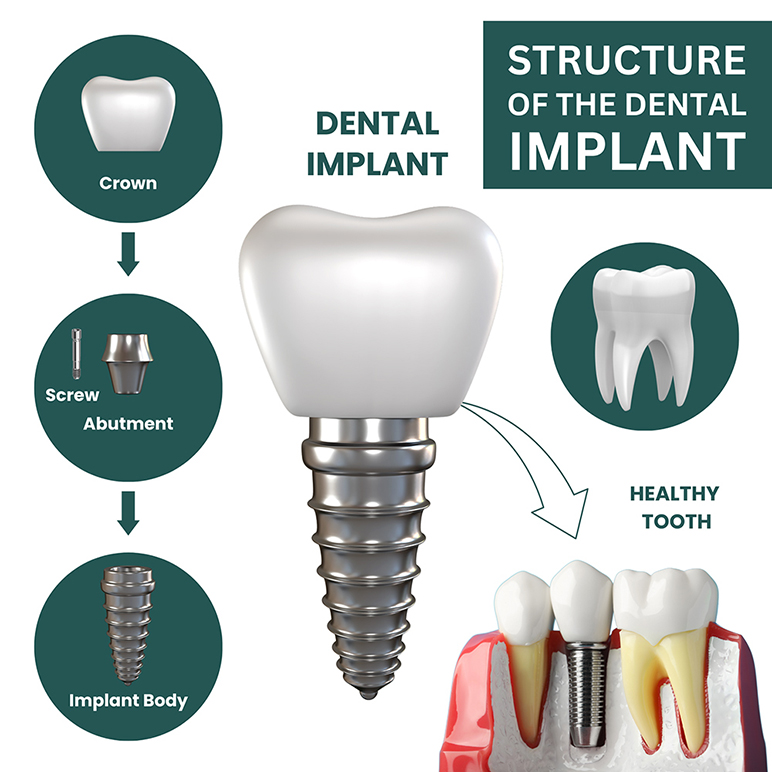
Types of Implants
- Single Tooth Implants: Used to replace a single missing tooth. A post is placed into the jawbone, and a crown is then attached on top, providing a natural and aesthetic solution.
- Multiple Tooth Implants: Designed to replace a few missing teeth. Multiple posts are placed into the jawbone to support crowns, enhancing aesthetics and function.
- All-on-4 Implants: This implant method is for those who have lost all teeth in one jaw. Only four implants are placed to support a complete fixed denture, providing stability and reducing surgery time.
- Implant-Supported Bridges: Used to replace multiple missing teeth in a row. Implants are strategically placed to support a dental bridge, offering stability and aesthetics for the patient.
Permanent dentures vs implants cost
The financial aspects of choosing between permanent dentures and dental implants play a crucial role in the decision-making process. A thorough examination of the initial costs and long-term financial implications will provide insight into which option might better suit your particular situation.
Initial costs and upfront expenses
When assessing the costs of permanent dentures versus implants, the initial outlay is one of the primary factors. Typically, a full set of conventional dentures ranges from $1,000 to $3,000 per arch. This price can vary based on factors such as geographic location and the complexity of the customizations needed.
Conversely, dental implants present a much higher initial investment. The cost of a single implant often ranges from $3,000 to $6,000, with a full set of implants costing between $20,000 and $50,000. Compared to Western countries, dental implants in Vietnam and Southeast Asia are more affordable, with an average cost of $620 per implant and full mouth implants starting at $4300. These prices reflect the multi-stage process involved in implant placement and emphasize the necessity for thorough research and consultations when budgeting for this option.
Long-term financial implications
Though permanent dentures offer a lower upfront cost, one must consider the long-term financial impacts. Dentures typically require replacement or relining every 5-10 years due to wear and tear and changes in the gum line. Regular maintenance and eventual replacements contribute to the overall financial burden.
On the contrary, dental implants are designed to last a lifetime with appropriate care. Although the initial investment is substantial, the longevity of the implants often results in lower long-term costs. Repairs or occasional replacements of crowns may be necessary over time, but these expenses tend to be minimal compared to the recurring costs associated with dentures.
Investing in dental implants may prove more economical in the long run, especially for those prioritizing stability and quality of life over short-term savings.
Insurance coverage and financial assistance options
Navigating insurance coverage and financing options for either permanent dentures or dental implants can be daunting. Dental insurance plans often differ widely in their coverage policies, particularly regarding tooth replacement options.
Some insurance plans may partially cover dentures, while others may impose limits on coverage for implants. It’s crucial to review your policy details and understand the benefits and limitations beforehand. Engaging your insurance provider in discussion concerning your specific circumstances can yield valuable insights.
For individuals facing financial constraints, various assistance programs may aid in covering the costs of dentures or implants. Dental schools and community health clinics occasionally offer discounted treatments, allowing individuals to access necessary care at reduced rates. Additionally, many dental practitioners provide payment plans or financing options to alleviate the financial burden, reflecting their commitment to making dental care accessible for all.
Comparison of costs between different dental restoration methods
The cost of dental restorations can vary significantly between different methods. To make a final decision, you should carefully consider factors such as cost, aesthetics, function, and the lifespan of the dental prosthesis. If you are wondering about the price of dentures vs implants or fixed dentures vs implants, here is a detailed comparison table for your consideration.
| Dental Restoration Method | Cost Advantages (Avg. USD/tooth) | Cost Disadvantages | Factors Affecting Cost |
| Dental Bridge | $300 – $1500 | Requires grinding down adjacent teeth for support, which can damage healthy teeth | Number of teeth to be replaced, type of dental crown material, complexity of the procedure |
| Fixed Partial Denture | $200 – $1000 | Less durable than implants and dental bridges, may cause bad breath | Number of missing teeth, denture material, precision of fabrication |
| Dental Implants | $1000 – $4000/tooth | Highest durability, excellent aesthetics, near-natural chewing function | Number of missing teeth, type of dental implant, type of dental crown, surgical technique, number of follow-up visits |
Factors Influencing the Cost
Several factors can impact the cost when comparing dentures vs implants cost:
Geographic location and treatment facility
The geographical area in which you seek treatment can significantly impact the cost of dentures and implants. Urban practices often charge higher fees due to increased overhead costs, while rural clinics may offer more affordable options due to lower living expenses.
Additionally, specialized dental facilities with advanced technologies might command premium prices compared to community clinics. When seeking treatment, it’s essential to explore various locations and practice types to find a balance between quality care and affordability.
Complexity of the case and required procedures
The complexity of a patient’s dental situation also plays a crucial role in establishing costs. For instance, if a patient requires bone grafting or other adjunct procedures prior to implant placement, the overall expense will increase. Similarly, the number of implants needed and the type of dentures selected can greatly influence pricing.
An accurate assessment of your unique case by a dental professional can clarify the anticipated costs and necessary procedures, allowing for well-informed decisions moving forward.
Materials used in manufacturing dentures and implants
The choice of materials utilized in constructing dentures and implants can markedly affect prices. Higher-quality materials, such as premium acrylic for dentures or zirconia for crowns, come with a higher price tag but often provide enhanced durability and aesthetics.
Patients should engage in discussions with their dental providers regarding material options to ensure they make choices aligning with both their cosmetic preferences and budget constraints.
Long-Term Financial Considerations
Hidden Costs of Dentures
Using dentures may incur additional costs for replacements or maintenance. These expenses can accumulate over time.
Investment in Dental Implants
Although the upfront costs for implants are higher, they represent a valuable investment. Implants do not require frequent replacements like dentures. They also help maintain jawbone health and prevent bone loss.
While permanent dentures vs implants cost presents clear differences, the choice between the two methods should not rely solely on price. Consider the health and aesthetic benefits each option provides. If you are seeking a long-term solution, dental implants may be the better choice.
The procedure for getting dental implants
The journey towards dental implants typically involves multiple stages, requiring careful planning and execution.
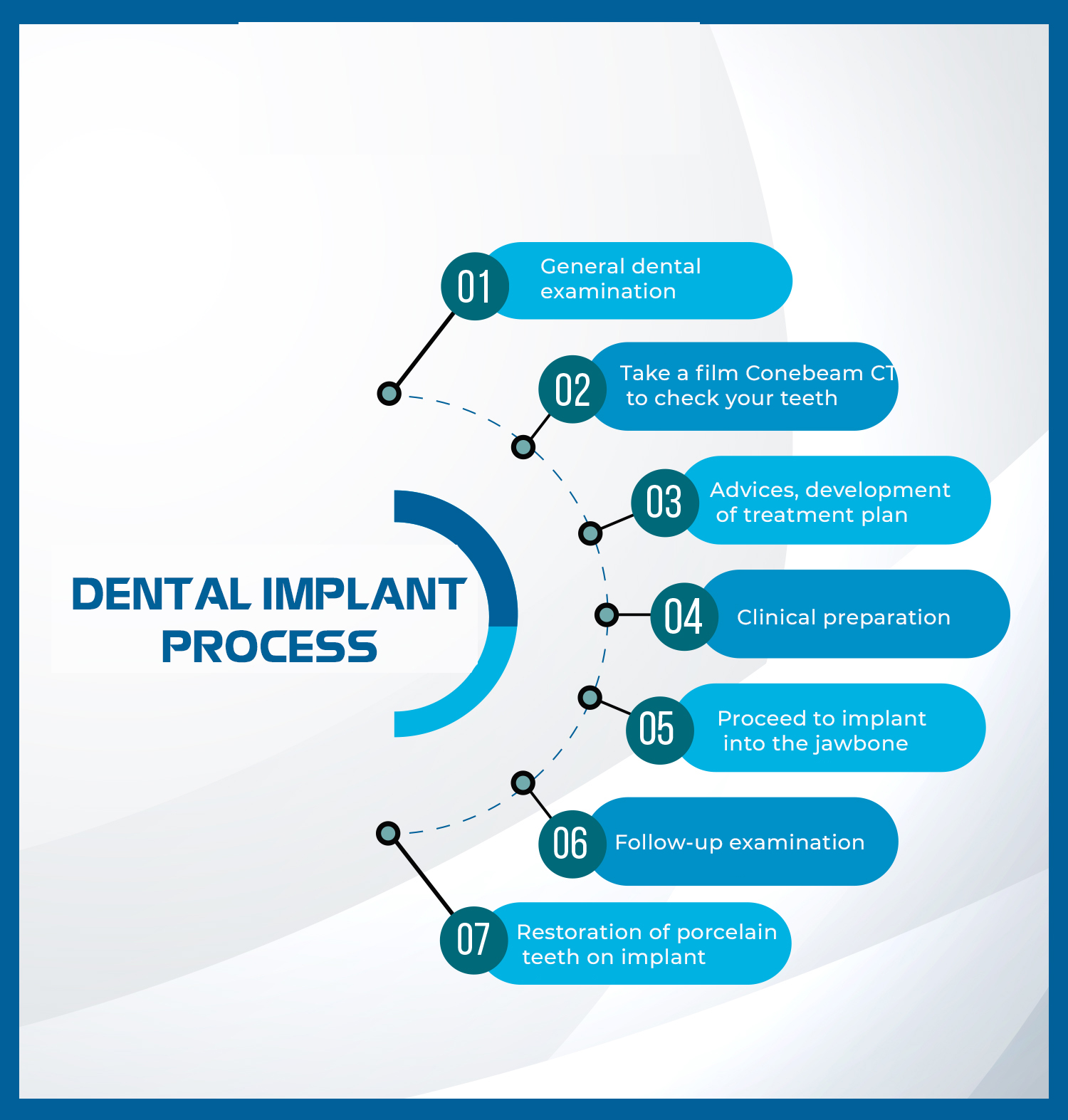
- Consultation and Assessment: The first step involves a comprehensive evaluation of your oral health, including the condition of the jawbone. Your dentist will discuss your treatment objectives, helping you set realistic expectations.
- Implant Placement: The next stage involves the surgical placement of the implant post into the jawbone, usually performed under local anesthesia or sedation. This procedure is typically straightforward, but it requires skilled hands.
- Osseointegration: After implant placement, osseointegration begins. This process can take several months, as the jawbone integrates with the implant to secure it firmly in place.
- Abutment Placement: Once osseointegration is complete, an abutment is attached to the implant post. This serves as a connector between the implant and the crown.
- Crown Placement: Finally, a custom-made crown is placed on top of the abutment, completing the restoration process. This crown is carefully designed to match the surrounding teeth in color and shape, ensuring a natural appearance.
Each stage of the procedure demands precision, patience, and commitment from both the dentist and the patient, making dental implants a thoroughly considered investment.
Advantages and disadvantages of dental implants
While dental implants boast numerous advantages, they also come with certain drawbacks that potential patients should consider.
Advantages:
- Exceptional durability and longevity: Under optimal conditions, dental implants can last a lifetime, making them a wise investment for those wanting a permanent solution.
- Natural feel and function: The integration with the jawbone allows for a stable and comfortable tooth replacement that mimics the feeling of a natural tooth.
- Improved chewing efficiency: Implants facilitate normal chewing and biting, allowing patients to consume a varied diet without limitations.
- Enhanced speech and pronunciation: Since implants are securely anchored and do not shift, they do not affect speech like traditional dentures might.
- Preserve jawbone health: By stimulating bone growth, dental implants help prevent jawbone deterioration, a common consequence of tooth loss.
- Improved oral hygiene: Dental implants can be maintained similarly to natural teeth, encouraging good oral hygiene without the special care required for dentures.
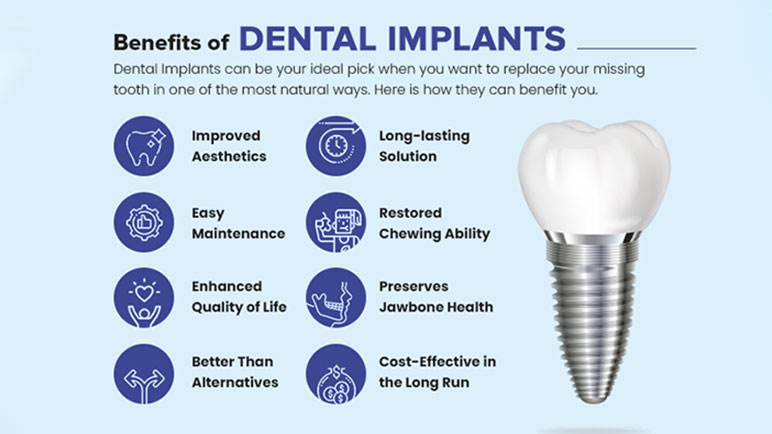
Disadvantages:
- High cost: The initial expense of dental implants is significantly higher than that of permanent dentures, which may deter some patients.
- Surgical procedure: Implant placement necessitates surgery, which carries inherent risks, including infection or nerve damage.
- Longer healing and recovery time: The osseointegration process can take several months, prolonging the overall timeline from consultation to completion.
- Not suitable for everyone: Certain medical conditions or inadequate bone density may hinder eligibility for implants, limiting options for some individuals.
- Potential complications: Although rare, complications such as implant failure can occur, underscoring the importance of diligent follow-up care.
Understanding these factors is essential for making a well-informed choice between dental implants and other viable options.
Patient considerations when choosing between options
Deciding between permanent dentures and dental implants involves evaluating various personal factors. Lifestyle preferences, health considerations, and psychological impacts all contribute to making a well-informed and satisfying decision.
Lifestyle and maintenance requirements
A critical factor to consider is your lifestyle and ability to maintain oral hygiene. Permanent dentures demand regular cleaning and removal, while dental implants require the same level of care as natural teeth. Individuals with busy schedules or those who struggle with maintaining meticulous oral hygiene may find the ease of implants to be a more practical solution.
Moreover, the potential dietary restrictions associated with dentures may influence choices depending on personal preferences and eating habits. Those who enjoy food variety may benefit from the functionality offered by dental implants.

Health factors and suitability for each option
Health conditions or medications can dictate suitability for either dentures or implants. For example, individuals with diabetes or those undergoing certain medications might face limitations regarding the viability of dental implants. Consulting with both a dentist and physician can help ascertain whether implants are an appropriate choice given your medical history.
Assessing individual health conditions and understanding how they interact with dental treatment options ensures that patients make informed decisions tailored to their needs.
Psychological impact and patient satisfaction
The psychological ramifications of tooth loss extend beyond aesthetics. Many individuals experience diminished self-confidence, which can affect relationships and social interactions. Dental implants often lead to greater satisfaction due to their natural appearance and functionality, empowering individuals to regain their lost sense of self-worth.
In contrast, while permanent dentures effectively restore smiles, some users may feel discomfort or psychological barriers associated with removable appliances. Taking into account how different restorative options may impact mental well-being is key to finding the solution that fosters confidence and happiness moving forward.
Conclusion
Choosing between permanent dentures and dental implants involves evaluating a range of factors, including cost, functionality, and aesthetics. Permanent dentures offer a more affordable and less invasive option for tooth replacement, but they require more maintenance and have a shorter lifespan than implants. Conversely, implants are a more durable and natural-looking solution that can significantly improve oral function and enhance quality of life. Ultimately, the best decision hinges on personal circumstances, preferences, and ongoing commitment to dental health. Engaging in open conversations with dental professionals can pave the way to achieving a beautiful and functional smile that aligns with your unique needs and aspirations.

 Google Reviews
Google Reviews Call
Call
SAIGON IMPLANT CENTER
Best dentist in Vietnam
Saigon Implant Center - Dental Clinic utilizes the latest technology for specialized treatment in the field of Single implant, full jaw implants, All on 4 implants, All on 6 implants, Zygoma implant....
SAIGON IMPLANT CENTER
Best dentist in Vietnam
Saigon Implant Center - Dental Clinic utilizes the latest technology for specialized treatment in the field of Single implant, full jaw implants, All on 4 implants, All on 6 implants, Zygoma implant....